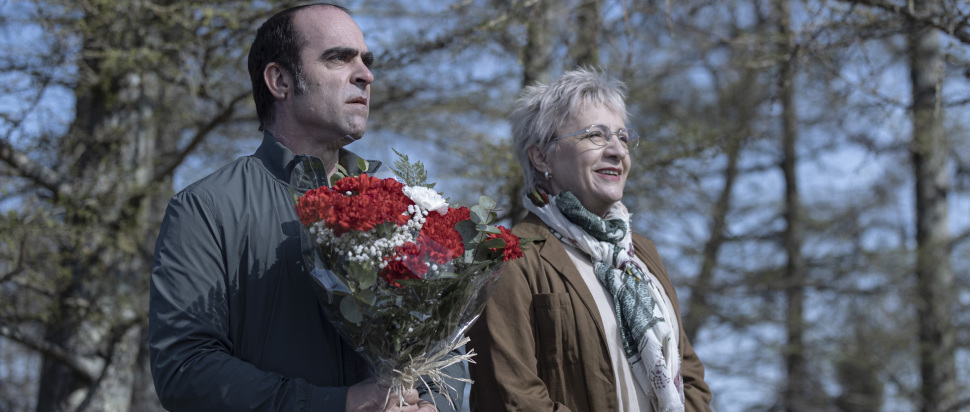Looking Violence in the Eye: Icíar Bollaín on Maixabel
As Maixabel – Icíar Bollaín's drama about a victim of terrorism – opens Edinburgh Spanish Film Festival, we talk to the director about delegitimising violence, and second chances
Political drama Maixabel, the latest film from Edinburgh-based Spanish director Icíar Bollaín, explores a dark episode in her nation's recent history. In 2000, Juan María Jáuregui, a socialist politician, was assassinated by the Basque separatist group ETA. More than a decade later, his wife, Maixabel Lasa, accedes to take part in the restorative meetings, a controversial short-lived government initiative where the victims sit down to talk with repentant members of that terrorist organisation.
“The producers suggested I make a film about Maixabel Lasa,” explains Bollaín. “I knew the story because years ago I read an interview with the victims who had met the perpetrators. I was startled.” She thought that making the film was a great opportunity to explore “the human complexity behind the idea of someone who is capable of sitting down and talking with the person who had hurt them the most.” She adds: “It was a very complicated film to make; it’s a very sensitive, painful subject. It’s still really controversial. There are so many people affected by ETA, and that pain is still there. Those meetings were debated at the time, and Lasa was criticised by some of the victims, who saw them as a betrayal to the murdered. This is a real story about real people – you are talking about a lot of victims. We had to be very careful not to open more wounds because the victims already had enough with what they went through to cause them more harm.”
Maixabel is not only the story of the victims. A significant part of the film is about the terrorists, who are deeply ashamed of their past actions. Balancing this without minimising the victim’s pain is a challenge and something that worried Bollaín. “We know so little about the etarras [members of ETA] in general," she says, "and specifically about those who distanced themselves from the band, which were very few. No one wants to know anything about the etarras and their world. They are people who have committed atrocious crimes, but Isa Campo [Bollaín's co-writer] and I knew that we had to understand their story, know who they were and how they made the journey from ETA to talk to their victims. The film is about the delegitimation of violence. Violence is useless and it only causes more violence. These men represent that.”
Maixabel is always completely respectful to the victims, despite giving a human dimension to the ex-terrorists. “When you give space to characters who are publicly considered to have no right to anything, and no one wants to know anything about them, you risk criticism," says Bollaín. “But we had a very clear idea that it was important to hear their voices. This is something that Maixabel Lasa said – ‘they [the repentant ETA members] are the biggest delegitimisers of violence because we can say whatever and it has no impact, but it’s incredibly powerful when they say it.”
Watching the film, it feels almost inevitable to think that it’s about forgiveness, but Bollaín emphasises that “Maixabel doesn’t talk about forgiveness. If anything, she gives a second chance. She said that these people are regretful, they’ve done a deep self-criticism exercise and she thinks everyone deserves a second chance. It’s something she believes is a human right. But she doesn’t talk about forgiveness.”
Lasa agreed to the making of the film after the producers became interested in her story. "[Maixabel] confessed to me that she did not know the exposure that this was going to have,” says Bollaín. “What convinced her [to do the movie] is that she is an activist for coexistence in the Basque Country and that she saw the film as an opportunity to publicise some meetings that she thought were very positive – not only for her but for our society, for them [the etarras], for the dialogue that must be done." Bollaín also remembers when Lasa realised that the project was bigger than what she had in mind: “The first time she came to the set she heard the conversation that Maixabel has in the film with her friend at the beach. They gave her headphones to listen to it and she started crying. She got very emotional, it was so beautiful.”
For both Lasa and Bollaín, it’s vital to tell this story like it happened, without idealising ETA’s nationalist ideology. “I notice that among people closest to that ideology there is an idealisation of ETA, and there’s a certain surprise at how the etarras speak about ETA in the film. There’s an idea that they were like freedom fighters. There are people who think that what ETA did was somehow justified.” That’s why Maixabel is an important film: it reminds us to never forget the devastating consequences of terrorism.
Maixabel opens the Edinburgh Spanish Film Festival on 1 Oct at Glasgow Film Theatre, and screens again at Filmhouse, Edinburgh on 7 Oct; Icíar Bollaín will give a Q&A at both screenings
Edinburgh Spanish Film Festival, 1 Oct-4 Nov, at various venues in Edinburgh, Glasgow and Stirling
